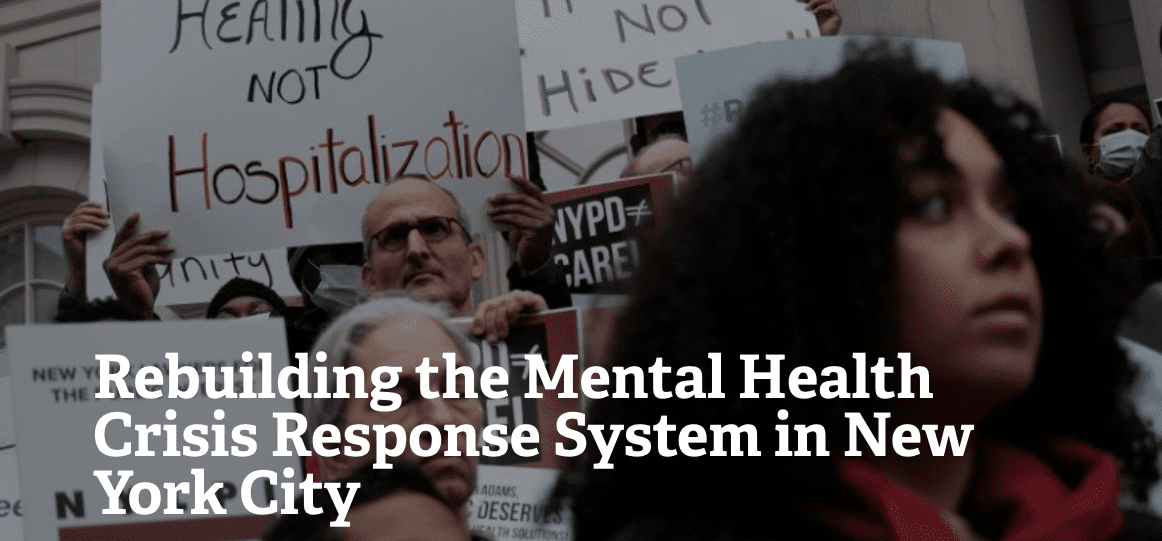on Apr 26, 2023
Fountain House Releases New Policy Road Map on Rebuilding Mental Health Crisis Response in New York City

Fountain House Releases New Policy Road Map on Rebuilding Mental Health Crisis Response in New York City
This press release was originally issued by Fountain House.
The report is based on the insights and recommendations of more than 100 Fountain House members, all of whom live with serious mental illness, and their experiences within New York’s current crisis response systems.
New York, NY — Fountain House, a national nonprofit created for and by people living with serious mental illness, today released a new policy road map on the steps New York City can and should take to improve its mental health crisis response system and close vital gaps in services and trust.
The report — developed with HR&A Advisors and with support from Trinity Church Wall Street Philanthropies — is based on the insights and recommendations of more than 100 members of Fountain House, all of whom live with serious mental illness, and their experiences within New York’s current crisis response systems. It calls attention to the rare opportunity New York City has, right now, to leverage historic levels of state and federal 988 funding to rebuild our approach to mental health emergencies and ensure it provides New Yorkers with swift, comprehensive, and compassionate care.
Among our key recommendations:
-
- Immediately increase funding for 988 in the next city budget to continue to scale the 988 system and its workforce; move as many mental health crisis calls as possible out of the 911 system; and integrate 988 services with the social service system to help people address root cause stressors, like housing insecurity, without having to navigate other bureaucratic hurdles while in crisis.
- Establish a Peer Oversight Board composed of people living with serious mental illness to provide guidance and accountability for the mental health crisis response system and its implementation.
- Bolster effective, ongoing mental health support by using the 988 system to connect people to lower-cost care navigation programs and community-based supportive services, including clubhouses, that can help people find treatment at all points in their recovery — saving lives, improving public safety, and helping prevent mental health crises in the first place.
The policy road map comes just days after an unidentified Bronx man was shot by NYPD officers while experiencing a mental health crisis. The case closely mirrors what happened to Raul de la Cruz, another Bronx man shot by police in March, and has sparked new debate over the role of law enforcement in mental health emergencies and whether they’re equipped to assess and de-escalate crises as our first and default responders.
Between 2015 and 2020, at least 18 people in New York City were killed by police while experiencing a mental health crisis. Nationally, people living with untreated mental illness are 16 times more likely to be killed during a police encounter compared to others approached by law enforcement.
“988 holds a lot of promise — and with the proper investment and public education efforts will save lives — but our work cannot stop there,” said Cesar Yoc, member of Fountain House Bronx. “The city must start thinking of mental health holistically and ensure people living with serious mental illness have access to ongoing, community-based care to meet our health and social needs — with efficiency, sensitivity, and quality treatment.”
“We urge city officials to invest in the 988 system — a move that will pay dividends for New York City and make it a national leader and standard bearer for mental health services,” said Lena Allon, Fountain House’s Policy Analyst. “Imagine 400 fewer calls to 911 daily, and instead, dedicated mental health crisis teams that can connect people to housing and community-based care for long-term mental health support. This approach can save countless lives and healthcare dollars while reducing the stigma surrounding mental illness. It also puts us on a path to fewer crises in the future, which is something we can’t say about our current system, and must be prioritized in our city budget.”
“This process of engaging people most affected by the issues should be the norm for analyzing and shaping public policy,” said Sarah Solon, Principal at HR&A Advisors. “HR&A is proud to partner with Fountain House and its members on this policy road map to rebuild New York’s mental health crisis response system and hope the city will urgently consider and implement our recommendations.”
You can download the report here: Rebuilding Mental Health Crisis Response in New York City
For more information on Fountain House and how we’re supporting people living with serious mental illness through direct services, practice innovation, advocacy, and policy change, visit FountainHouse.org.
Fountain House
Fountain House is a national mental health nonprofit fighting to improve health, increase opportunity, and end social and economic isolation for people living with serious mental illness. Founded in 1948 in New York City, Fountain House originated the clubhouse model of community mental health that has been replicated more than 300 times in nearly 40 U.S. states and in 30 countries around the world.Media Coverage for the Report
“Report calls for crisis hotline to replace 911 for mental health emergencies in NYC” — Gothamist (April 2023)
Photo: Fountain House